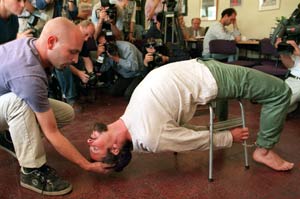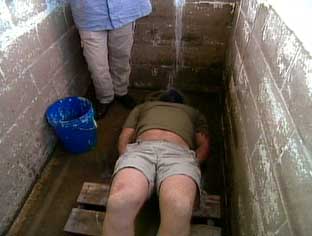Israeli Unaccountability and Denial: Suppressing the Practice of Torture
[During a press conference held by the Israeli human rights group B'Tselem, actors demonstrate the Israeli Shin Bet torture method known as "Banana b'kiseh," where a detainee with hands and feet cuffed is painfully stretched, in the shape of a banana, over a chair by his jailer.]
The Public Committee Against Torture in Israel (PCATI - stoptorture.org) "believes that torture and ill-treatment of any kind and under all circumstances is incompatible with the moral values of democracy and the rule of law." Yet it's systematically practiced by the Israeli Police, General Security Service (GSS), Israeli Prison Service (IPS), and Israeli Defense Forces (IDF).
In December 2009, PCATI published its latest report titled, "Accountability Denied: The Absence of Investigation and Punishment of Torture in Israel," explaining "the many layers of immunity that protect" the guilty, specifically the GSS, the focus of this report.
Immunity insures that GSS interrogation torture and abuse complaints never become criminal investigations, indictments, or legal hearings. Israel's State Attorney and Attorney General assure it "under a systemic legal cloak" giving torturers "unrestricted protection."
Since 2001, victims submitted over 600 torture complaints to authorities. None were investigated - "the first step" before indictments, prosecutions, and convictions. As a result, GSS interrogators have blanket immunity to operate freely "behind closed doors (making) torture an institutionalized method of interrogation in Israel, enjoying the full backing of the legal system." As in America, torture is official Israeli policy.



























